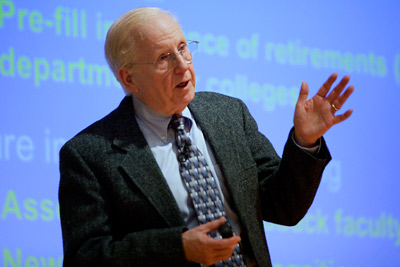Provost: Focus, decide how to do less with fewer resources
By Susan Kelley


For the next five years, Cornell must focus on a handful of key initiatives and leave less important ones by the wayside.
"In this era of constrained resources, I don't think we need to do more with less," said Provost Kent Fuchs Feb. 25 at a public discussion on Cornell's strategic plan. "We need to do less with less resources. We need to find what we should stop doing. Otherwise we begin to spread ourselves really thin and … our quality may suffer."
About 25 people attended the event, hosted by Fuchs and Edward Lawler, who chairs the Strategic Planning Advisory Council (SPAC).
The strategic plan is part of the university's three-pronged effort to "reimagine Cornell." While the SPAC drafts a plan for the university's vision and goals through 2015, the Initiatives Coordination Office is cutting administrative costs, and Fuchs is considering recommendations from 20 academic task forces on ways to strengthen the university's academic enterprise with tighter budgets.
Questions from the audience ranged from which metrics the administration would use to measure its progress on the strategic plan's goals to how the plan would affect campuswide institutes and centers.
But the central theme that emerged was that Cornell must pare down its breadth while strengthening its depth.
Reimagining Cornell events
A draft of the Strategic Plan is at http://www.cornell.edu/reimagining/plan.cfm. E-mail comments to strategicplanning2010@cornell.edu. The following discussions are all planned for 12:15-1:15 p.m., Ramin Parlor Room, Sage Hall:
• March 3: Strategic Plan brown-bag lunch, co-hosted by Provost Kent Fuchs and ILR professor Edward Lawler;
• March 4: "Managing Change" brown-bag lunch, hosted by Mary Opperman, vice president for human resources, and Paul Streeter, associate vice president for planning and budget; and
• March 25: "Managing Change" brown-bag lunch, hosted by Opperman and Streeter.
For more information, see http://www.cornell.edu/reimagining/.
Michael Stratford '11, College of Arts and Sciences, asked how exactly the administration would determine which areas to concentrate on. Fuchs replied that students, deans and faculty members would determine the academic agenda. "I think we can do less and be better. … I'm just going to keep asking tough questions: 'What are you going to stop doing?'" Fuchs said. "Some of (these decisions) will be controversial. There are very few things we do at Cornell that are not really good. So we're choosing between good things and that's tough."
In response to a question on how the concept of Cornell as a singular unit would affect campuswide institutes and centers, Fuchs said the units should remain affiliated with colleges to receive the academic and administrative support they need. "I don't think they should all report to Day Hall," Fuchs said.
Lawler, the Martin P. Catherwood Professor of Industrial and Labor Relations and former dean of the ILR School, gave a brief overview of the plan's draft outline. The SPAC has identified six key initiatives to focus on through 2015: foster Cornell as a singular unit and soften boundaries among colleges; maintain faculty excellence in the face of upcoming retirements; support teaching; lead in research; enhance diversity and inclusion; and embrace public engagement as the university's outreach mission.
He emphasized that dealing with the large number of retirement-age faculty -- and the gap they will leave -- will be one of Cornell's greatest priorities in the next five years. Ideally the university would fill most of those posts before the professors retire. "The quality of this institution could rise or fall depending on how Cornell handles this faculty renewal problem," Lawler said.
The SPAC will post online a second draft of the plan in mid-March and complete the final plan by summer.
Media Contact
Get Cornell news delivered right to your inbox.
Subscribe